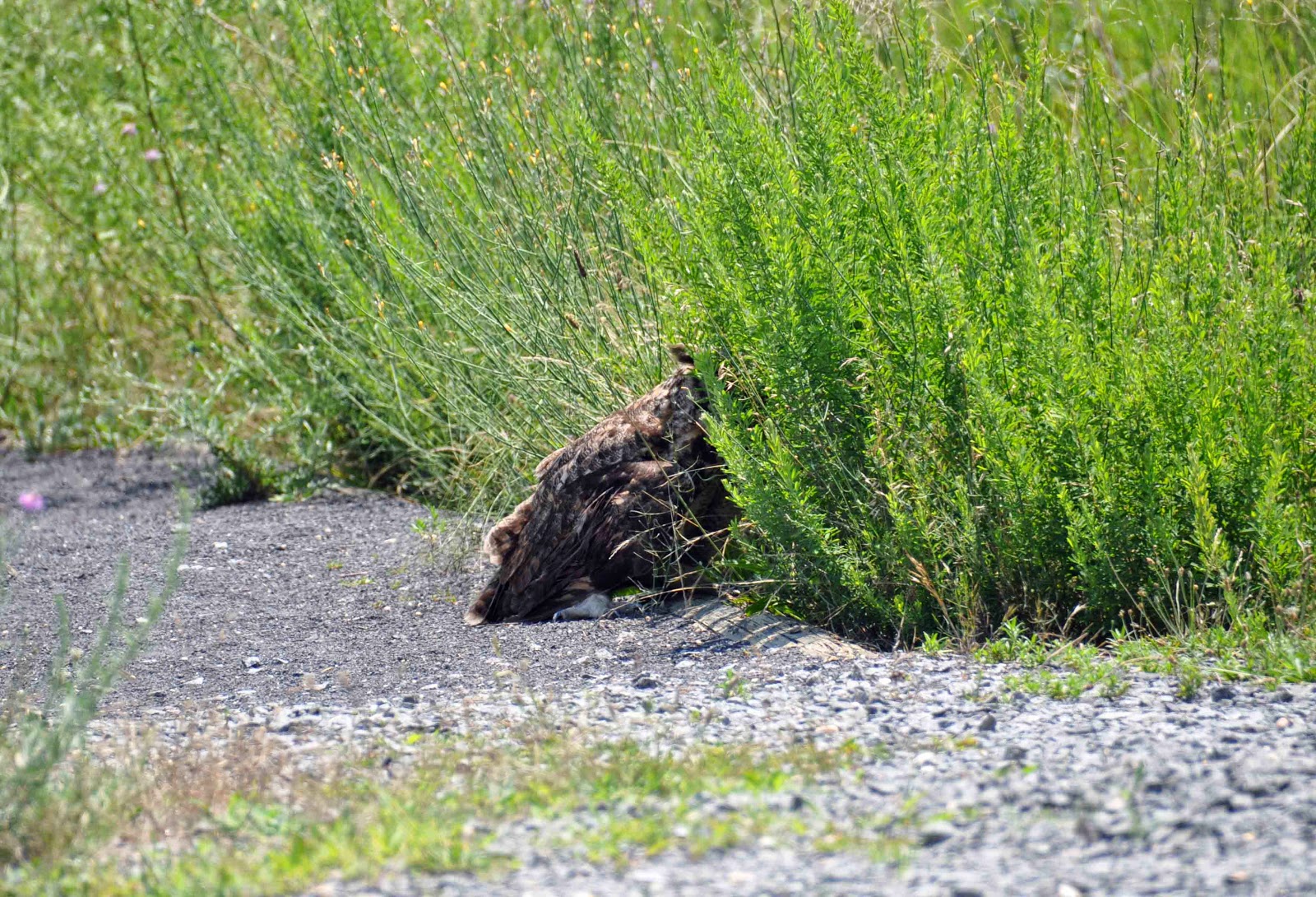It is interesting to watch the shorebird numbers build up at Brig. Last week, Shari & I had lots of Willets, a few oystercatchers, some Lesser Yellowlegs and some SB Dowitchers. Today, on the trip with Pete & Mike, the diversity was much higher. Nothing extraordinary (we'll have to wait until August for the really exciting shorebirds to be a possibility) but very good looks at Long-billed Dowitchers (though I'm only listing the one I was able to view carefully, there was a small flock of them) was a highlight. The Short-billed/Long-billed Dowitcher complex is always one of great controversy, especially this time of year when the LBs are listed as "rare," but today's birds had all the field marks, not just the rather subjective hump.
Other birds I was happy to see were Blue Grosbeaks (M&F), Indigo Bunting, and a juvenile Yellow-crowned Night-Heron, a bird that seems to be exceedingly hard to find this year in NJ.
A bird I am not so happy to have seen, in retrospect, was a Great Horned Owl.
We pulled into the parking lot of the Experimental Pool and heard Pete calling out a bird, but didn't know what it was. Mike positioned his vehicle in an odd way and then they both urged the rest of the group either not to get out of their cars, or else to stand behind theirs, using it as a blind. They had found the owl on the path that leads to the observation deck of the pool. I was only able to get photos of its back.
Seeing an owl midday is strange. Seeing an owl midday on the ground, stranger still. I didn't have a good feeling about this bird. Some speculated that it had pounced on some prey and was waiting for us to go away before flying off with it, but that didn't seem right to me--they're nocturnal hunters after all.
We revisited the site on our second loop around the impoundments and the owl was gone. Later, in the visitor's parking lot as we were all saying our goodbyes, one of the volunteers came up to us and asked if we'd taken pictures of the bird. Of course we had. "Well, those are the last pictures of that bird, because about 2 hours ago someone reported it dead. I went out there and picked it up." He said the bird will be tested for West Nile Disease. Of course, the bird could just have been old and died. Knowing what we know now, it appears a bit unseemly for us to all have been gawking at the bird in its last moments.
For the day I managed 71 species, only 16 less than the group's total. My list herewith:
Canada Goose 50
Mute Swan 16
Wood Duck 2
American Black Duck 6
Mallard 7
Double-crested Cormorant 10
Great Blue Heron 2
Great Egret 50
Snowy Egret 10
Black-crowned Night-Heron 1
Yellow-crowned Night-Heron 1 SE Pool
Glossy Ibis 25
Turkey Vulture 5
Osprey 15 Most on nests
Red-tailed Hawk 2
Clapper Rail 2 Heard
American Oystercatcher 10
Black-bellied Plover 9
Killdeer 1 Heard
Spotted Sandpiper 1
Greater Yellowlegs 10
Willet 15
Lesser Yellowlegs 1
Whimbrel 6
Least Sandpiper 2
Semipalmated Sandpiper 50
Short-billed Dowitcher 10
Long-billed Dowitcher 1
Short-billed/Long-billed Dowitcher 5
Laughing Gull 50
Ring-billed Gull 1
Herring Gull 50
Great Black-backed Gull 25
Least Tern 5
Gull-billed Tern 4
Forster's Tern 100
Black Skimmer 25
Mourning Dove 1 Heard
Great Horned Owl 1
Ruby-throated Hummingbird 2 Picnic tables & exit
Downy Woodpecker 1 Heard upland area
Northern Flicker 1 Experimental Pool
Peregrine Falcon 2
Great Crested Flycatcher 1
Eastern Kingbird 4
White-eyed Vireo 1 Heard upland area
Blue Jay 1
Fish Crow 1 Heard, picnic tables
Northern Rough-winged Swallow 1
Purple Martin 25
Tree Swallow 20
Barn Swallow 3
Carolina Chickadee 1 Heard, upland area
Tufted Titmouse 1 Heard, upland area
Marsh Wren 5
Carolina Wren 2
Blue-gray Gnatcatcher 2
American Robin 2
Gray Catbird 5
European Starling 50
Common Yellowthroat 5 Heard
Eastern Towhee 1 Heard, near Jen's Trail
Chipping Sparrow 1 Heard, upland area
Field Sparrow 1 Heard, upland area
Seaside Sparrow 5
Song Sparrow 4
Blue Grosbeak 2 Female at beginning of drive, male at dogleg
Indigo Bunting 2
Red-winged Blackbird 50
Boat-tailed Grackle 1
Brown-headed Cowbird 1 Heard, parking lot
American Goldfinch 2

No comments:
Post a Comment